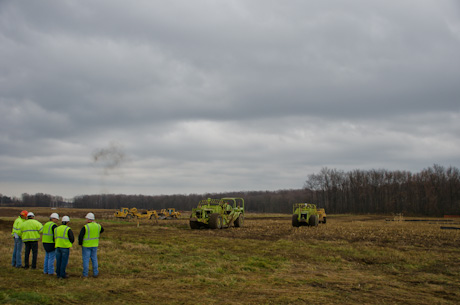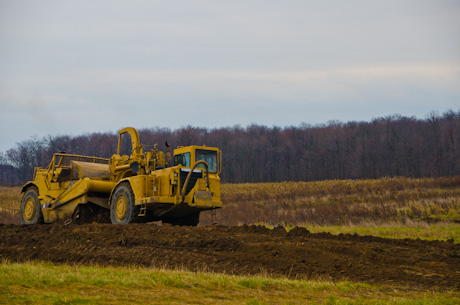Project Wave -- which we now know is being pursued by PepsiCo -- will be the largest yogurt plant in North America, according to an industry expert with more than 15 years in the field.
Jeff Stephen, a consultant with Productive Partners, said in an interview today that what Pepsi is planning is impressive and will be a huge benefit to the community and the local dairy industry.
"Pepsi isn't the kind of company that is going to go anywhere," Stephen said. "They're not going to cut back because of any shortage of money. This is everything you could ask for in a local community. They are going to be successful. Not everything will go to plan, but they will succeed. This is a major global commitment."
Based on industry reports, Pepsi wants to get into the yogurt business. The multinational firm is planning a merger of sorts with Theo Muller Group, a German company that makes seven different yogurt products.
Stephen said companies for years have been trying to crack the U.S. yogurt market in the belief that American consumers don't buy as much yogurt as they should. Europeans consume five or six times as much yogurt as Americans, Stephen said.
The key to the U.S. yogurt market, Stephen said, is to make yogurt with more body and texture, a yogurt that can be consumed as a meal or a key ingredient in a meal. Growth in the U.S. yogurt market has been thwarted, Stephen said, because too much of the product available in the U.S. is what Stephen called "crappy dessert yogurt."
The key to the U.S. market is Greek yogurt, which has more flavor, is more filling and has greater nutritional value.
That's the kind of yogurt that will be the basis of Alpina's product line. Alpina was the first big signing for Genesee County Economic Development Center in the new ag park. Alpina is building an initially 10,000-square-foot facility that will employ 50 people.
Pepsi's plans begin with a 300,000-square-foot facility that will employ 180 people, with a build out by 2033 of 16 production lines and 600 employees.
There is no yogurt plant in North America that's close to that size, Stephen said.
When Stephen saw what was being planned for Project Wave, as first reported on The Batavian, he figured Pepsi, whose plans with Theo Muller had already been reported by the Wall Street Journal, was a likely prospect for the property. A project of that size would almost certainly be a plant for a large corporation moving into a new product line.
The deal bringing Pepsi to Batavia hasn't been signed yet, but construction has begun on the facility and Pepsi is clearly eager to get its new product to market by 2013.
Stephen just hopes Pepsi is planning a yogurt line based on Greek yogurt and not "crappy dessert yogurt," which he doesn't think will help Pepsi or other yogurt makers expand the U.S. market.
Whatever Pepsi does, he doesn't see the Pepsi products competing directly with Alpina, which will be producing a slightly higher end yogurt and going after niche markets.
Pepsi's main competitors will be Dannon and Yoplait.
Dannon, based in White Planes, is a pure dairy company and between its two main brands, controls about 38 percent of the yogurt market. Yoplait, owned by General Mills, has another 6 percent. The rest of the market is shared by regional players and store brands, some of which, Stephen said, are very good.
Another potential local player in the yogurt market is O-AT-KA Milk Products, which is owned by Upstate Niagara Cooperative.
The rumor is that a current expansion at O-AT-KA is for the local plant to start making yogurt ingredients.
It's unknown who the ingredients will be sold to, but Upstate purchased a 100-year-old, one-line yogurt plant in Watertown about a year ago.
Charitably, Stephen said, the Watertown plant is "historic," but it shows Upstate's intention to move into the yogurt business.
Whatever product Pepsi brings to market, Stephen said, will be thoroughly researched and well marketed.
"I have very high respect for Pepsi," Stephen said. "They are efficient in manufacturing and production and very good marketers. They are not the kind of company that gives up."
It's unknown whether Pepsi will purchase its dairy products through O-AT-KA or directly from farmers (those are discussions that probably haven't even taken place yet, Stephen said), but as for farmers, Stephen said they will be happy working with Pepsi.
Pepsi, he said, takes an approach that being easy to work with helps lower costs.
"I think the farmers will want to do business with them," he said.
As for milk supply, the market will probably be shaken up for awhile initially, but the big farmers have little trouble adding capacity (more cows) and there should be an ample milk supply in Western New York to meet the needs of Pepsi, Alpina and O-AT-KA, and any other players that enter the market at the ag park.
Perhaps the worst news for other dairy businesses, Stephen said, is that if Pepsi wants to hire an employee, they will hire that employee. They will spend what it takes, he said, to get the best employees, especially in key positions.
But it's a great pool of employees that is attracting Pepsi to Batavia, Stephen said.
For years, he's been telling dairy companies to stop manufacturing in places like Los Angeles, New York and Philadelphia because the standard of living is so much better in smaller communities.
Employees can actually afford to buy a house in a place like Batavia. That isn't true in larger population centers. And, Stephen said, the schools are good, and that's attractive to a major employer.
"You have a pretty high quality of life," Stephen said. "It's a pretty attractive place to put people who are going to work for you for a long time."


